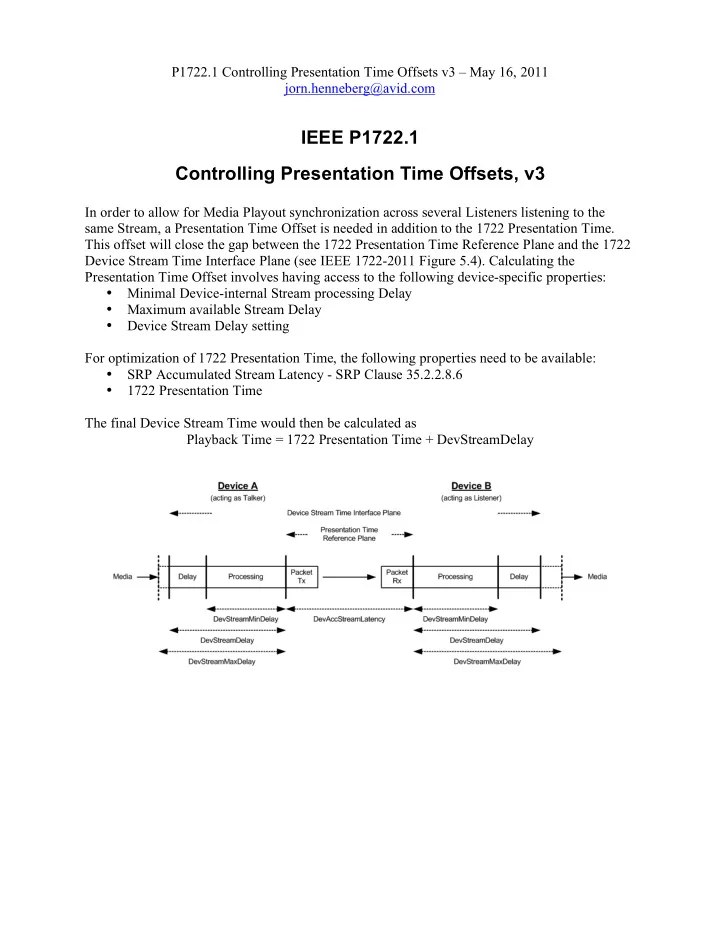

P1722.1 Controlling Presentation Time Offsets v3 – May 16, 2011 jorn.henneberg@avid.com IEEE P1722.1 Controlling Presentation Time Offsets, v3 In order to allow for Media Playout synchronization across several Listeners listening to the same Stream, a Presentation Time Offset is needed in addition to the 1722 Presentation Time. This offset will close the gap between the 1722 Presentation Time Reference Plane and the 1722 Device Stream Time Interface Plane (see IEEE 1722-2011 Figure 5.4). Calculating the Presentation Time Offset involves having access to the following device-specific properties: • Minimal Device-internal Stream processing Delay • Maximum available Stream Delay • Device Stream Delay setting For optimization of 1722 Presentation Time, the following properties need to be available: • SRP Accumulated Stream Latency - SRP Clause 35.2.2.8.6 • 1722 Presentation Time The final Device Stream Time would then be calculated as Playback Time = 1722 Presentation Time + DevStreamDelay
P1722.1 Controlling Presentation Time Offsets v3 – May 16, 2011 jorn.henneberg@avid.com Minimal Device-internal Stream Delay ( DevStreamMinDelay ) Minimal Device-internal stream delay between 1722 Presentation Time Reference Plane and Device Stream Time Interface Plane. Included are delays of e.g. digital processing blocks, ADC/DAC conversion delays etc. Allowed to be set to 0. This property applies to both Talkers and Listeners, and is read-only by a Controller. Property subject to change on device configuration changes (processing blocks added, nominal Sample Rate changed, etc.) Maximum available Stream Delay ( DevStreamMaxDelay ) Maximum Stream Delay a device is capable to handle. Mostly dependent on Device architecture (available memory etc.). Allowed to be always set to DevStreamMinDelay by vendor. This property applies to both Talkers and Listeners, and is read-only by a Controller. Current Device Stream Delay setting ( DevStreamDelay ) Amount of currently selected delay. Cannot exceed DevStreamMaxDelay , and cannot be less than DevStreamMinDelay . This property applies to both Talkers and Listeners, and Controller have read/write access. SRP Accumulated Stream Latency ( DevAccStreamLatency ) Worst-case stream latency as reported by SRP (Clause 35.2.2.8.6). Giving access to a Controller allows modifications of 1722 Presentation Times Class defaults, but is usually not used to calculate DevStreamDelay . However, for Listener implementations with minimal functionality, this property might impact DevStreamMaxDelay . This property applies to Listeners only, and is read-only by a Controller. 1722 Presentation Time The 1722 Presentation Time as included in every 1722 packet. Defaults to 2ms. This property applies to Talkers only, and Controller have read/write access.
P1722.1 Controlling Presentation Time Offsets v3 – May 16, 2011 jorn.henneberg@avid.com Example Use Cases Example 1: Wavefront-aligning Listeners (with fixed 1722 Presentation Time) 1) Controller gets or has a list of Listeners listening to the Stream in question and which are supposed to be wavefront-aligned (how this is done is beyond the scope of this proposal) 2) Controller reads DevStreamMinDelay and DevStreamMaxDelay for all Listeners 3) Controller calculates delay = max( DevStreamMinDelay ) 4) Controller checks delay <= min( DevStreamMaxDelay ) 5) Controller sets DevStreamDelay for all Listeners to delay Example 2: Optimizing the 1722 Presentation Time for a Stream 1) Controller gets a list of all Listeners listening to the Stream in question (how this is done is beyond the scope of this proposal) 2) Controller reads DevAccStreamLatency for all Listeners 3) Controller calculates delay = max( DevAccStreamLatency ) 4) Controller sets Stream’s 1722 Presentation Time property in Talker to delay Optimization is supposed to occur only in a controlled environment (e.g. with User/Admin interaction) and with all associated Listeners up and running. Adding Listeners after optimization will likely result in Stream tear-down and re-running the optimization.
Recommend
More recommend